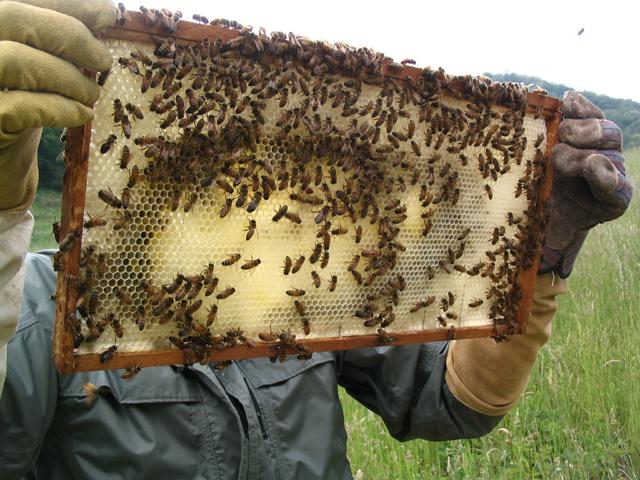Media outlets were abuzz about honey at the end of 2011, and it’s still making the news in the new year. Unfortunately, reports aren’t so sweet. The gist? The quality of most honey on store shelves is questionable. Fortunately, local beekeepers are ready to help you navigate the headlines. And, they say, it’s actually simple to tell the real stuff from the faux.
“There are two main issues,” says Diane Almond, owner and operator of Honey Bees and Heather Farm in Fletcher. “One: Is the honey really honey — made by bees from nectar they collect from flowers and not tainted with the addition of manmade corn syrup or cane sugar syrup? Two: Is the honey what its label claims it is? Sourwood is the best example; much of honey labeled Sourwood is not.”
Almond distills it even further. “For me and my customers [and] students, it comes down to pure honey.” She means nothing added, nothing removed. “Big honey processors use very high heat, which kills off the enzymes the bees added. They also use pressure to push honey through super fine micro filters, taking out pollen grains. And, they even use diatomaceous earth to remove contaminants.”
In the honey world, there are no standard definitions for natural and raw, Almond notes. But, she hopes she’s starting to paint a picture — at least of what real, natural honey is not.
So what is it? “It’s the pollen. It’s your local pollen, nectar, propolis,” says Kathy Taylor of KT Orchard and Apiary in Canton. “When you taste local honey, you will know. It’s the best thing that’s ever hit your lips!”
The bees’ offerings of pollen define natural honey for Taylor, which she says is why she has to be so careful with the environment. “You protect the bees and you put out pollinators that the bees love; in our orchard, we’ve got apple trees, peaches, nectarines.” She stresses she’s there to protect all bees. “I think sometimes people get sidetracked and think we’re on a honeybee journey, but we’re on a bee journey. We’ve got to be on the bandwagon for pollinators.”
Should her customers want their honey as natural as possible, she offers it up with wax and other bee parts and eggs. For those who don’t want those things in their sweetener, it takes a quick pass through a strainer, but it’s never heated and filtered.
Knowing your honey producers means you know the process they used to get their honey to you. And that’s the takeaway message with it comes to recent media coverage, producers say: buy local honey and know your beekeeper.
“I’m the bottling machine; you’re talking to it,” echoes Dave Cowart of Dave’s Raw Honey in Leicester. As his customers get to know him, he hopes they trust him to share his process and to label his products truthfully. As a sourwood producer he knows that the variety is often mislabeled. “We have bragging rights worldwide (a regional sourwood won “Best Tasting Honey” at the World Honey Congress), and when there’s a limited amount of the best honey, people are going to try and say they’ve got it.” But not Cowart. “What I have is what I have,” he says. “If I don’t have enough for the season, I’ll tell you and let the chips fall where they may.”
“At risk of sounding like a broken record,” Almond repeats to those trying to make sense of a barrage of reports, “your best bet is to buy honey from a local beekeeper who uses best management practices, who you can trust.”
Where can you find these beekeepers’ final products? Almond sells to a growing list of loyal, longtime customers directly and at events. To join the list, give her a call at 684-8488 or contact her through her website, http://honeybeesandheather.com. Cowart primarily sells at Asheville-area tailgate market (in season), but he expects to have some honey through the winter. He can be reached at 683-0082. Taylor keeps her barn open year-round, where she also sells beekeeping supplies and other honey products and farm goods. The farm and its stand are located at 158 Pigeon Ford Road in Canton. Reach Taylor at 301-5370. Search for more honey producers, including those selling at winter tailgate markets, in ASAP’s online Local Food Guide at http://buyappalachian.org.
While it’s no longer Get Local honey month at area restaurants, you can still expect Appalachian Grown partners to use the sweet stuff. We hear The Market Place, for example, is serving up a lavender-honey creme brulee with local honey now. Find out what’s on February’s calendar on the Get Local page of http://asapconnections.org.




Before you comment
The comments section is here to provide a platform for civil dialogue on the issues we face together as a local community. Xpress is committed to offering this platform for all voices, but when the tone of the discussion gets nasty or strays off topic, we believe many people choose not to participate. Xpress editors are determined to moderate comments to ensure a constructive interchange is maintained. All comments judged not to be in keeping with the spirit of civil discourse will be removed and repeat violators will be banned. See here for our terms of service. Thank you for being part of this effort to promote respectful discussion.